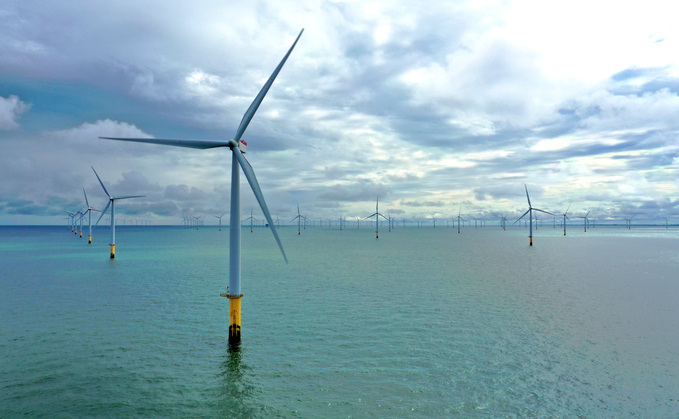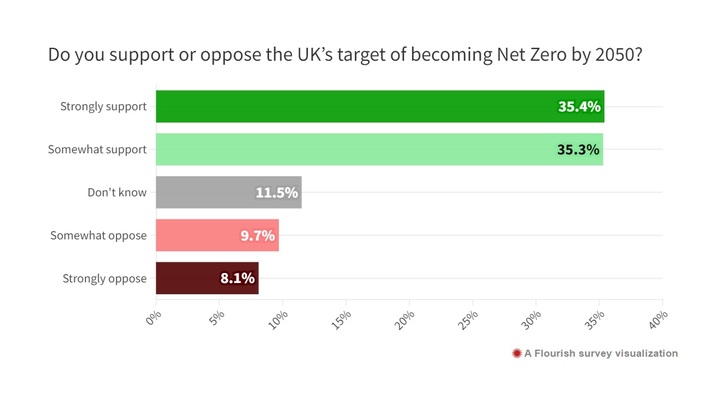
Latest polling reveals 70 per cent of the public support the government’s net zero goal, with just 18 per cent opposed
The government risks paying an electoral price, if it listens to calls from Tory backbenchers to water down its net zero targets.
That is the conclusion of new polling commissioned by the Energy and Climate Change Intelligence Unit (ECIU), which confirms that 70 per cent of the public support the current target of reaching net zero emissions by 2050, compared to just 18 per cent who oppose the goal.
Significantly, support for the target is higher among Conservative voters, rising to 73 per cent, with opposition at 19 per cent.
The Focaldata poll of just over 2,000 adults found that just over 35 per cent of voters 'strongly support' the net zero by 2050 target, while the same proportion 'somewhat support' it.
In contrast, only eight per cent 'strongly oppose' the target, just under 10 per cent 'somewhat oppose' it, and the remaining 11.5 per cent do not know.

Critics of the government's net zero strategy have alleged that while a sizeable majority of the public support the target and are in favour of climate action more generally, backing is significantly lower for specific decarbonisation policies.
However, the latest polling suggests that when asked about a number of decarbonisation policies 65 per cent of people said they would be 'proud' of a party which wanted to generate more electricity from renewable sources versus seven per cent who would be 'embarrassed'. Similarly, 47 per cent would be 'proud' of a party that would lift the effective ban on new onshore wind farms in England, compared to 11 per cent who would be 'embarrassed'.
Meanwhile, people are four times more likely to support energy efficiency programmes than want to see them curtailed.
More broadly, the polling echoes other recent surveys that have found public concern over the environment is at or near record levels.
The survey found climate change and the environment are a top four issue for 31 per cent of people surveyed, behind the economy, health, and immigration. Similarly, the most recent YouGov tracker poll of public concerns similarly found the environment was a top three issue for a third of the public.
"With public support for the target still strong, and broad support for the kind of policies required to achieve it, politicians will need to be careful when thinking about how they will campaign on climate and the environment," said Alasdair Johnstone, head of parliamentary engagement at the ECIU. "If parties want to build a broad base of voters, then a strong offering on the environment and tackling climate change is clearly important."
The latest polling comes as the government faces growing tensions within the Conservative Party over its climate policies.
In the wake of last month's mixed bag of by election results, Prime Minister Rishi Sunak promised a more "proportional and pragmatic" approach to meeting the UK's net zero goals, as he publicly backed plans for new oil and gas projects and approved delays to a number of environmental policies.
The move prompted criticism from some Conservative MPs and Ministers, who warned the government risked undermining investment in green industries and alienating the majority of voters who want to see more ambitious climate policies.
However, leading figures on the right of the Party urged Number 10 to go further still in rolling back environmental programmes, calling on Sunak to ditch or delay the overarching net zero target, along with a host of decarbonisation policies.
And today, the government faced fresh calls to delay plans to end the sale of new oil boilers from 2026, with a number of Conservative MPs warning the policy could become a "ULEZ for rural communities".
"Rural communities are about to have their own version of the Ulez dumped on them," former Environment Secretary George Eustice told the Telegraph. "They should call off the ban on the sale of boilers and pursue a different strategy, which would be to properly incentivise renewable fuels in those boilers."
Juliet Phillips, senior policy advisor at think tank E3G, said a delay to the proposed ban on the sale of new oil boilers was now "inevitable", but she warned policy action was urgently needed to tackle emissions from off grid heating systems.
"The government consulted on a 2026 fossil heating phase-out timeline for off-grid homes back in 2021, but never issued a response to the consultation," she said. "Over the two year period since then, the Conservatives have done nothing to provide rural homes and businesses the clarity or support necessary to meet this timeline. Therefore, delay to this regulation has long been inevitable.
"High and volatile heating prices have long been a problem in rural communities. Improving energy efficiency and deploying heat pumps can permanently lower bills, fuel poverty and carbon emissions. The government needs to take a joined-up approach to ensure plans to phase out fossil heating systems are affordable, fair and practical."